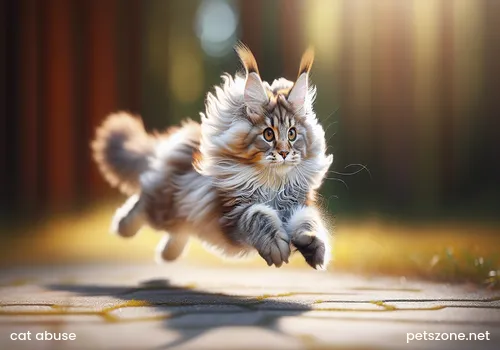What Happens When People Abuse Cats_The Serious Consequences and Legal Responsibilities of Cat Abuse
Abusing cats not only causes tremendous physical and psychological trauma to these lovely animals but may also violate laws and reflect the abuser’s own underlying psychological problems. The consequences of such behavior are multifaceted and far from trivial.

Abusing Cats: More Than Just Physical Harm
Imagine a lively and adorable kitten that should be chasing and playing in the sun, suffering unnecessary pain and torment. The forms of cat abuse vary widely, from simple scolding and beating to severe starvation, binding, and even cruel dismemberment and burning. Each causes irreversible harm to the cat’s body and mind.
Cats are sensitive creatures with acute hearing; loud scolding can be physically painful to them. Long-term abuse causes cats to live in constant fear, similar to how humans become ill when under chronic stress. This seriously impairs their immune system and increases the risk of illness.
In addition to physical pain, the psychological trauma caused by abuse is equally profound. Cats may become abnormally anxious, depressed, or even exhibit aggressive or extreme avoidance behaviors toward humans. Such psychological shadows may last a lifetime, making it difficult for them to trust humans again or be accepted by new families. Studies show animals sometimes prefer enduring physical pain over emotional torment.
Animal Abusers: Possible Psychological Problems Behind the Behavior
What drives a person to harm an innocent animal? Animal abuse is not a simple case of a momentary impulse; it often hides complex psychological factors. Psychiatrists suggest that animal abuse may be linked to violent tendencies and antisocial personality traits.
Some abusers feel helpless and out of control in real life, gaining a sense of control and satisfaction by abusing weaker animals. Sometimes, this behavior reflects a desire for power, where they prove their “strength” by hurting animals. Others may lack empathy, unable to perceive animal suffering, and may even derive pleasure from it.
People who suffered abuse in childhood are more prone to abuse animals later, possibly as emotional projection or learned violent behavior. Research indicates a worrying connection between animal abuse and interpersonal violence, serving as a potential early warning sign for future violence against people. U.S. statistics show nearly all violent criminals had experience abusing animals in childhood. Therefore, timely intervention in animal abuse protects not only animals but also public safety.
Psychological issues potentially involved in animal abuse include:
- Lack of Empathy: Unable to understand or feel the animal’s pain and fear.
- Emotional Management Problems: Venting negative emotions on animals.
- Seeking Control: Gaining a sense of power by hurting animals.
- Antisocial Tendencies: Deriving pleasure from animal suffering, lacking remorse.
- Childhood Trauma: Being an abuse victim or witness themselves.
If you find yourself or someone around you displaying tendencies to abuse animals, it is very important to seek professional psychological counseling or therapy, and you can also reach out to animal protection organizations or relevant authorities for help.
Legal Responsibilities: Abusing Cats is Not Beyond the Law
Although China has yet to enact a dedicated "Anti-Animal Abuse Law" specifically for companion animals, this does not mean cat abuse is legally unregulated. The existing legal framework provides some protection, and related legislative efforts are ongoing.
Under current laws, animal abuse may carry the following legal responsibilities:
- Property Damage Compensation: If the abused cat belongs to someone else, the abuser’s actions may constitute intentional damage to property, requiring corresponding compensation. In some cases, courts recognize the emotional bond between pets and humans, allowing owners to claim emotional distress damages.
- Disturbing Public Order: Abusing animals in public places or spreading videos of animal abuse may be seen as disturbing social order, punishable under the Public Security Administration Punishment Law, such as detention. Spreading videos of animal killing also violates network information content regulations.
- Other Relevant Laws: Laws such as the Wildlife Protection Law and Animal Epidemic Prevention Law also regulate certain types of animal abuse in specific circumstances.
In addition, some local governments actively promote animal protection legislation; cities like Shenzhen, Beijing, and Shanghai have issued or are revising regulations to prohibit abandonment and abuse of companion animals.
While legal constraints are still improving, public opinion and moral condemnation play important roles in curbing animal abuse. In recent years, incidents like the "Jack Spicy Stick Cat Abuse Case" have attracted widespread social attention and condemnation, and abusers have been punished accordingly. Some universities and companies also consider moral behavior in admissions or hiring, which in some ways restrains animal abuse behavior.
How to Report Animal Abuse?
If you encounter animal abuse in daily life, you can take the following actions:
- Ensure Personal Safety and Collect Evidence Scientifically: Under the premise of ensuring your own safety, try to collect evidence such as videos and photos, record abuser characteristics, locations, etc. Covert filming is advised to avoid direct conflict.
- Call the Police Immediately in Emergencies: If abuse is happening and the animal is in life danger, call 110 immediately and clearly state the location and situation.
- Report Through Multiple Channels for Non-Emergency Situations:
- Contact local animal protection associations or NGOs for help.
- Call the citizen hotline 12345 to file complaints.
- Report to local public security or relevant government departments.
- If at school or community, report to school security or property management.
- Record videos and post on social media to raise awareness (protect personal information and safety).
- Report spreading of abuse videos on online platforms.
Promoting anti-animal abuse legislation requires the joint efforts of society. By actively reporting, participating in discussions, and submitting legislative suggestions to representatives, each of us can contribute to building a more life-respecting society.
Frequently Asked Questions
- Q: Is abusing cats a crime in China?
- A: Currently, China does not have a specific "Anti-Animal Abuse Law," but cat abuse may violate existing laws such as intentional damage to property, disturbing public order, and may face civil compensation, administrative penalties, or even criminal responsibility.
- Q: Why do some people abuse animals?
- A: Reasons are complex and may relate to abusers’ lack of empathy, emotional management issues, seeking control, childhood trauma, or potential antisocial tendencies.
- Q: What should I do if I find someone abusing a cat?
- A: First ensure your safety, then try to collect evidence and promptly report to police, animal protection groups, or relevant authorities.
Conclusion
The behavior of "people abusing cats" causes not only great physical and psychological pain to cats but also challenges human civilization and moral boundaries. It may reflect abusers’ psychological problems and have potential links to social safety. Although China’s animal protection legal system is still improving, existing laws already regulate some aspects of abuse, and society is actively working towards related legislation.
Protecting animals is everyone’s responsibility. We should all respect life and treat animals kindly. When witnessing animal abuse, do not stay silent—stand up bravely to report it. Through our actions, we defend the dignity of life and work together to create a harmonious and loving social environment.





